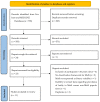The Relationship between Metabolic Syndrome and Frailty in Older People: A Systematic Review and Meta-Analysis
- PMID: 35893323
- PMCID: PMC9330874
- DOI: 10.3390/geriatrics7040076
The Relationship between Metabolic Syndrome and Frailty in Older People: A Systematic Review and Meta-Analysis
Abstract
Aims: Both metabolic syndrome (MetS) and frailty are associated with increased all-cause mortality, yet the complex interplay between these two conditions has not adequately been elucidated. We aim to analyse the relationship between MetS and frailty through a systematic review of the literature with meta-analyses.
Methods: A literature search was conducted via MEDLINE and EMBASE. Studies were included if validated frameworks for defining frailty and MetS (presence of at least 3 out of the five constitutive components: abdominal obesity, high fasting blood glucose, hypertension, hypertriglyceridaemia, and low high-density lipoprotein level) were utilised, in addition to the inclusion of participants aged 60 or older.
Results: Eleven studies were included, all observational. All were in community-dwelling older people, 9 cross-sectional and 2 longitudinal. Most of the studies used Fried's frailty phenotype. The prevalence of frailty ranged from 0.9% to 14.8% in population-based studies and 35.6% in the outpatient clinic setting. The prevalence of MetS was also higher in the outpatient clinic setting at 47.5%, compared to 17.5-41.0% in the community-dwelling populations. The meta-analysis of 11 studies showed that MetS was associated with an increased risk of frailty (pooled OR 1.73, 95% CI, 1.41-2.13).
Conclusion: This systematic review and meta-analysis suggest that frailty was more prevalent in older people with MetS compared to older people without MetS. The study findings suggest the importance of frailty screening in older people with MetS and a distinct role of managing MetS in preventing frailty in older people.
Keywords: diabetes; dyslipidemia; frailty; hypertension; metabolic syndrome; obesity; older people.
Conflict of interest statement
The authors declare no conflict of interest.
Figures








Similar articles
-
Prevalence of Metabolic Syndrome and Association with Physical Activity and Frailty Status in Spanish Older Adults with Decreased Functional Capacity: A Cross-Sectional Study.Nutrients. 2022 May 30;14(11):2302. doi: 10.3390/nu14112302. Nutrients. 2022. PMID: 35684102 Free PMC article.
-
Association between metabolic syndrome and risk of both prevalent and incident frailty in older adults: Findings from The Irish Longitudinal Study on Ageing (TILDA).Exp Gerontol. 2023 Feb;172:112056. doi: 10.1016/j.exger.2022.112056. Epub 2022 Dec 13. Exp Gerontol. 2023. PMID: 36526097
-
Prevalence of metabolic syndrome among HIV-positive and HIV-negative populations in sub-Saharan Africa-a systematic review and meta-analysis.Syst Rev. 2019 Jan 3;8(1):4. doi: 10.1186/s13643-018-0927-y. Syst Rev. 2019. PMID: 30606249 Free PMC article.
-
Gender differences in the impact of metabolic syndrome components on mortality in older people: A systematic review and meta-analysis.Nutr Metab Cardiovasc Dis. 2020 Aug 28;30(9):1452-1464. doi: 10.1016/j.numecd.2020.04.034. Epub 2020 May 12. Nutr Metab Cardiovasc Dis. 2020. PMID: 32600955
-
Prevalence of Frailty among Community-Dwelling Older Adults in Asian Countries: A Systematic Review and Meta-Analysis.Healthcare (Basel). 2022 May 12;10(5):895. doi: 10.3390/healthcare10050895. Healthcare (Basel). 2022. PMID: 35628034 Free PMC article. Review.
Cited by
-
Prevalence and coexistence of locomotive syndrome with reduced mobility and metabolic syndrome: a cross-sectional study of 35,059 Japanese adults.Sci Rep. 2025 Apr 19;15(1):13547. doi: 10.1038/s41598-025-98288-2. Sci Rep. 2025. PMID: 40253522 Free PMC article.
-
Examining determinants of control of metabolic syndrome among older adults with NCDs receiving service at NCD Plus clinics: multilevel analysis.BMC Health Serv Res. 2024 Sep 27;24(1):1118. doi: 10.1186/s12913-024-11562-3. BMC Health Serv Res. 2024. PMID: 39334103 Free PMC article.
-
Correlation of alternative healthy eating index with risk of frailty among metabolic syndrome individuals: a cross-sectional study.Aging Clin Exp Res. 2025 Mar 17;37(1):91. doi: 10.1007/s40520-025-02992-y. Aging Clin Exp Res. 2025. PMID: 40095232 Free PMC article.
-
The association of multidimensional frailty with metabolic syndrome and low-grade inflammation in community-dwelling older adults in the Netherlands: a Lifelines cohort study.Immun Ageing. 2024 Nov 13;21(1):78. doi: 10.1186/s12979-024-00484-7. Immun Ageing. 2024. PMID: 39538284 Free PMC article.
-
Frailty after Liver Transplantation: A Complex Unexplored Issue.J Clin Med. 2024 Aug 2;13(15):4537. doi: 10.3390/jcm13154537. J Clin Med. 2024. PMID: 39124803 Free PMC article. Review.
References
-
- Expert Panel on Detection, Evaluation, and Treatment of High Blood Cholesterol in Adults Executive Summary of the Third Report of the National Cholesterol Education Program (NCEP) Expert Panel on Detection, Evaluation, and Treatment of High Blood Cholesterol in Adults (Adult Treatment Panel III) JAMA. 2001;285:2486–2497. doi: 10.1001/jama.285.19.2486. - DOI - PubMed
Publication types
LinkOut - more resources
Full Text Sources

